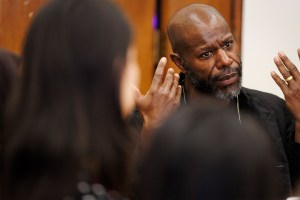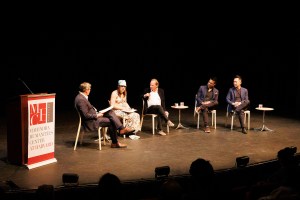Wilson perceives social structure and culture as key causes of poverty
In speaking frankly about the seemingly implacable problems in the inner cities, Harvard University Professor William Julius Wilson traveled a road that liberals fear to tread and that conservatives tend to take.
Wilson, the Lewis P. and Linda L. Geyser University Professor and an award-winning author and researcher, dissected the twin influences of culture and social structure in the persistence of youth violence, unemployment, and fragmentation of families within poor African-American communities and concluded that both factors must be considered in determining how to end the cycle of poverty.
“For many years, social scientists and other observers have debated the role of social structure versus culture in determining the social outcomes of African Americans,” Wilson said during a talk on “More Than Just Race: Social Structure and Culture in the Study of Inner City Poverty,” the first colloquium of the year of the W.E.B. Du Bois Institute for African and African American Research on Oct. 1.
“Conservatives tend to emphasize cultural factors, such as attitude, worldview, [and] styles of behavior, whereas liberals pay more attention to structural conditions, with attention devoted to racialist structural factors, such as discrimination and segregation.”
Indeed, “many liberals are reluctant to discuss or research the role that culture plays in the negative outcomes found in inner cities,” possibly fearing criticism that they are “blaming the victim,” Wilson said.
However, Wilson — described by Du Bois Institute Executive Director Vera I. Grant as “without question our foremost authority on urban poverty” — said he has created a framework that combines cultural and structural factors to analyze the perpetuation of the inner-city ghetto.
Drawing on research from his upcoming book, “More Than Race: Being Black and Poor in the Inner City” (W.W. Norton, 2009), Wilson outlined how cultural norms of life in an unsafe neighborhood — avoiding eye contact, mistrusting neighbors, and demanding respect — could be construed as anti-social behavior in another setting, such as a job interview.
“Note that the same culture frames in the inner city have not only been shaped by race and poverty but have, in turn, shaped the responses to poverty,” he said.
Wilson cited studies that find that informal codes regulate the inner city’s underground economy and that such “codes of shady dealing” reinforce behavior as well as create social relationships. “Informal rules actually govern what appears on the surface to be random underground activity,” he said.
Respect is a key element of these “rules of the street.” Researchers find “that for some young men, the draw of the street is so powerful they cannot avail themselves of legitimate employment opportunities when they become available,” Wilson said.
But although Wilson argues that cultural patterns should be considered, he maintains that more weight should be given to the structures created by racism, which, while clearly diminished in the United States, still lingers in the form of “laissez-faire” racism, “a perception that blacks are responsible for their own economic predicament.”
The long-term impact of poverty is pernicious; Wilson cited a seven-year study of 750 Chicago-area children, age 6 to 12, that found that the verbal skills of children of poor families still remain low compared with children of the more well-to-do, even when poor families moved to safer, more affluent neighborhoods.
“Culture matters, but I would say it doesn’t matter as much as social structure,” he said. “Structure trumps culture.”
Wilson also quoted at length from the March speech on race given by Democratic presidential candidate Barack Obama, saying his frank discussion “provides a model of what I had in mind.”
During the lively and frequently passionate question-and-answer period that followed Wilson’s talk, Henry Louis Gates Jr., Alphonse Fletcher University Professor, spoke of the influence of culture in his life.
“Our mothers believe in culture,” Gates said, explaining how his mother told him and his brother that they could do anything that they set their minds to do. “My brother and I were hypnotized by that.”
Gates asked Wilson what he would suggest if a President Obama were to ask him, “What do I do first?”
“The first thing you do is put [racial issues] on the table as an important policy agenda,” Wilson responded. Pressed for specifics, he said, “Public education is where I would start.”
Bennett Boskey Professor of Law Lani Guinier insisted that poor black communities should not be viewed as isolated from general pop culture and indeed, maybe suffer from “some of the worst elements of American culture.”
The far-reaching discussion also touched on concerns about the decreasing economic status of middle-class blacks and the need for social agency like the Civil Rights Movement of the early 1960s, which energized black churches. Orlando Patterson, the John Cowles Professor of Sociology, spoke about the need for engagement, saying, “At some point we have to show how we are going to get the horse to drink.”




